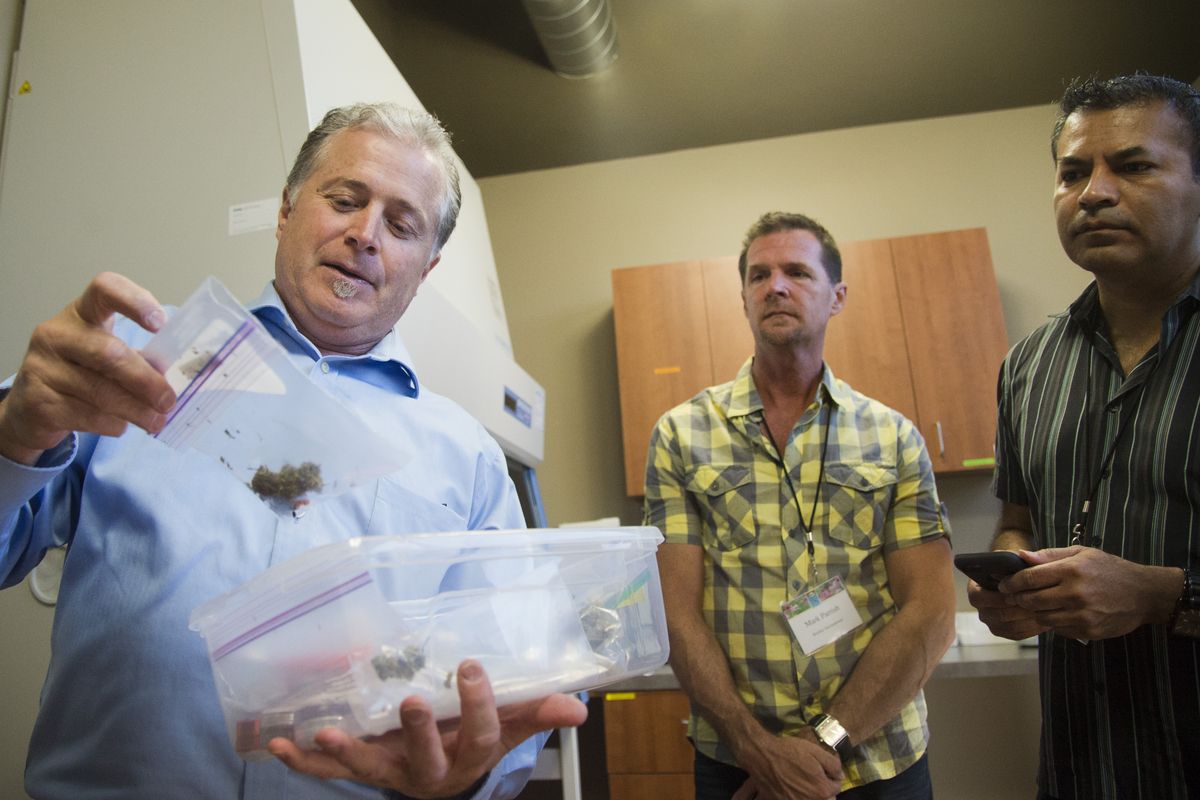Scientists hope new research on pot will aid those with anxiety, PTSD

One marijuana bud smelled like citrus, the other had a musky scent.
During a Friday morning tour of Grower George in Spokane Valley, Brandon Powell invited visitors to contrast the differing scents of two varieties of marijuana. Girl Scout Cookies, the musky-smelling variety, has anti-inflammatory properties, Powell said.
“It’s great for stress; it will bring you down,” he said. The other variety, Northern Lights, is better known for its euphoric effects.
The tour was made up of plant scientists, who are interested in research possibilities related to Washington’s cannabis crop.
“It’s a big new cash crop in the state,” said Amit Dhingra, a Washington State University associate professor in genomics. “We want to support economic development through science.”
Washington is one of several states where recreational pot use is legal, and among 23 states where medical marijuana use is allowed. Yet beyond THC – the psychoactive chemical in marijuana – much remains unknown about the plant’s other cannabinoids, the compounds that act on receptors in cells. For both medical and recreational users, there’s a growing interest in marijuana strains with high levels of a non-psychoactive compound associated with reduced anxiety and anti-inflammatory benefits.
There are anecdotal stories about marijuana’s therapeutic benefits, but the science to support or deny many of the claims is lacking, Dhingra said.
Rigorous research will create a “safer, more predictable product” for all users, he said.
The hundreds of hybrid varieties of marijuana is part of the research challenge. Dhingra – who’s done genomic sequencing in Washington’s hops, apple, pear and cherry crops – recently did sequencing on marijuana hybrids. The work will help reveal “the unique genetic identity” of different strains, he said.
Dhingra used publicly available DNA data for his study, to avoid having marijuana plants on WSU’s Pullman campus. But a new law, signed by Gov. Jay Inslee in April, creates a state licensing process to grow marijuana for research purposes. The law also allows WSU and the University of Washington to collaborate with license holders for research purposes.
The universities “could really help push the industry forward,” said Jessica Tonani, chief executive officer of Verda Bio, a Seattle biotech company.
Verda Bio’s goal is to advance medical marijuana research, until doctors have a clear idea of dose, effects and risks for patients, Tonani said.
“What we have right now is not a medical system, but a system of hope,” she said. Patients smoke or ingest marijuana with the hope it will ease symptoms, but there’s not the medical understanding of why it does or doesn’t work, she said.
Consistency of product also is a concern, Tonani said. “Harlequin” is a commonly sold variety of marijuana in Washington. But when Verda Bio ran chemical analyses on Harlequin strains purchased at different stores, the product varied widely.
Advancing the science of marijuana will help growers, too, said Powell, Grower George’s manager.
The Spokane Valley operation has 400 marijuana plants, representing 16 cannabis strains. Each strain has a different chemical profile, which produces different effects in users, Powell said. But the industry’s marketing abilities are limited at this point.
When the pot is sold at a state-licensed retail outlet, “we can’t say that it benefits you in a medical way,” Powell said.
Friday’s tour was part of a medicinal plants conference at WSU Spokane, which attracted about 120 researchers from different states and several countries. Scientists on the tour also visited a marijuana processing operation in a Spokane Valley warehouse and the Sativa Sisters retail outlet on Trent Avenue. The tour ended at Trace Analytics, one of 14 state-certified laboratories where cannabis headed for retail stores is tested for quality assurance.
“We’re very passionate about seeing the science move forward,” said Gordon Fagras, Trace Analytics’ chief executive officer.
But marijuana’s federal status as an illegal drug still presents barriers to research, said Dr. Sue Sisley, an Arizona doctor and psychiatrist who spoke at the conference.
She’s gained national recognition for her efforts to study marijuana’s therapeutic properties for treating PTSD, after veterans told her that smoking pot reduced their anxiety, insomnia, nightmares and depression.
Sisley received Food and Drug Administration approval for the study in 2011 but ran into other federal and state roadblocks. She said her activism on the issue cost her her position at the University of Arizona.
“The politics around this plant are like plutonium,” she said. “It’s crazy how people respond.”
Sisley is now working on the study with a partner at Johns Hopkins University. They hope to get the research underway this summer with veterans whose PTSD hasn’t responded to other treatments.